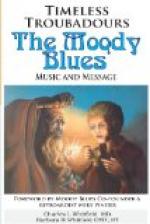“Lady, I have prayed you long to love me of your kindliness... my heart [97] is more drawn to you than to any lady of Genoa. I shall be well rewarded if you will love me and shall be better recompensed for my trouble than if Genoa belonged to me with all the wealth that is there heaped up.” The lady then replies in her own Genoese dialect: she knows nothing of the conventions of courtly love, and informs the troubadour that her husband is a better man than he and that she will have nothing to do with him. The poem is nothing but a jeu d’esprit based upon the contrast between troubadour sentiments and the honest but unpoetical views of the middle class; it is interesting to philologists as containing one of the earliest known specimens of Italian dialect. An example of the Tuscan dialect is also found in the descort by Raimbaut. This is a poem in irregular metre, intended to show the perturbation of the poet’s mind. Raimbaut increased this effect by writing in five different languages. He found a ready welcome from Bonifacio II. at the court of Montferrat which Peire Vidal also visited. The marquis dubbed him knight and made him his brother in arms. Raimbaut fell in love with Beatrice, the sister of the marquis, an intimacy which proceeded upon the regular lines of courtly love. He soon found an opportunity of showing his devotion to the marquis. In 1194 Henry VI. [98] made an expedition to Sicily to secure the claims of his wife, Constance, to that kingdom: the Marquis Boniface as a vassal of the imperial house followed the Emperor and Raimbaut accompanied his contingent. He refers to his share in the campaign in a later letter to the marquis.[30]
Et ai per vos estat en greu preyzo
Per vostra guerra e n’ai a vostro
pro
Fag maynt assaut et ars maynta maiso
Et a Messina vos cobri del blizo;
En la batalha vos vinc en tal sazo
Que.us ferion pel pietz e pel mento
Dartz e cairels, sagetas e trenso.
“For your sake I have been in hard captivity in your war, and to do you service I have made many an assault and burned many a house. At Messina I covered you with the shield; I came to you in the battle at the moment when they hurled at your breast and chin darts and quarrels, arrows and lance-shafts.” The captivity was endured in the course of the marquis’s wars in Italy, and the troubadour refers to a seafight between the forces of Genoa and Pisa in the Sicilian campaign. In 1202 he followed his master upon the crusade which practically ended at Constantinople. He had composed a vigorous sirventes urging Christian men to join the movement, but he does not himself show any great enthusiasm to take the [99] cross. “I would rather, if it please you, die in that land than live and remain here. For us God was raised upon the cross, received death, suffered the passion, was scourged and loaded with chains and crowned with thorns upon the cross.... Fair Cavalier (i.e. Beatrice) I know not whether I shall stay for your sake or take the cross; I know not whether I shall go or remain, for I die with grief if I see you and I am like to die if I am far from you.” So also in the letter quoted above.




